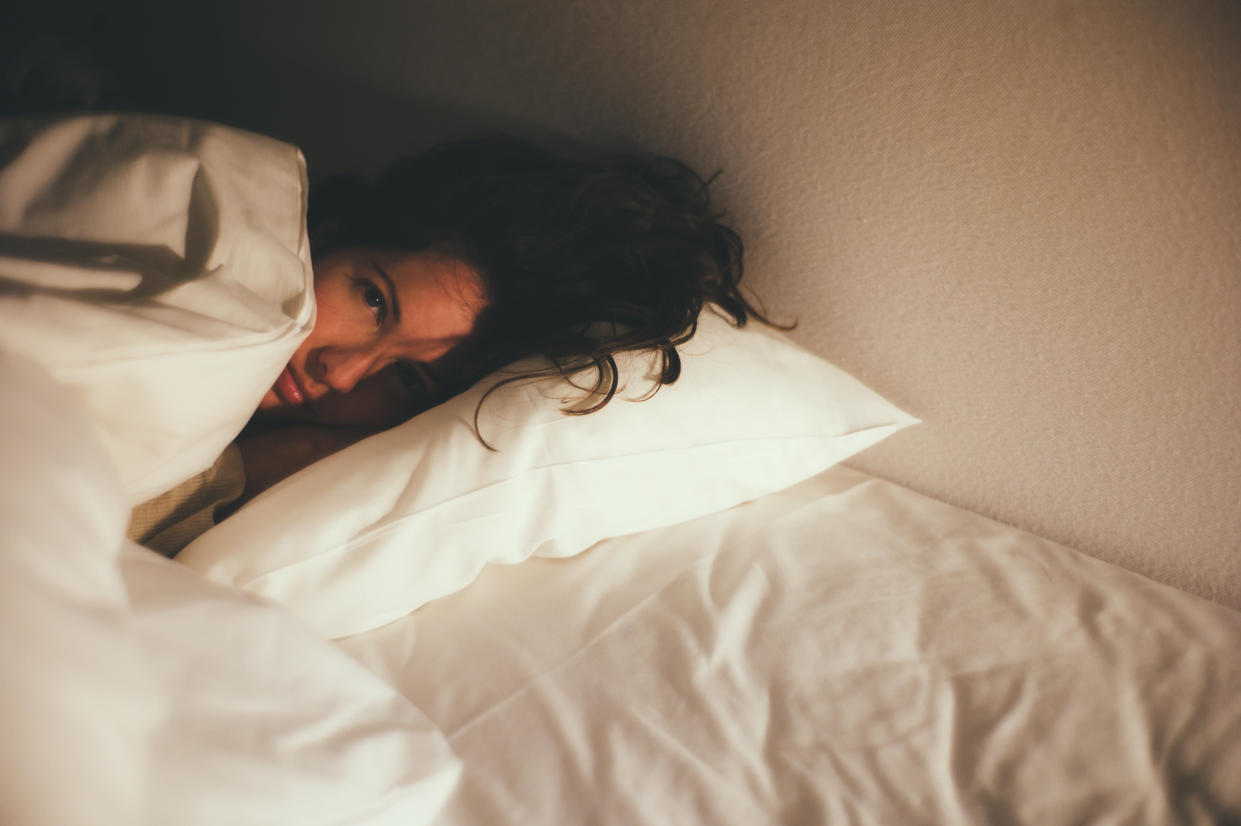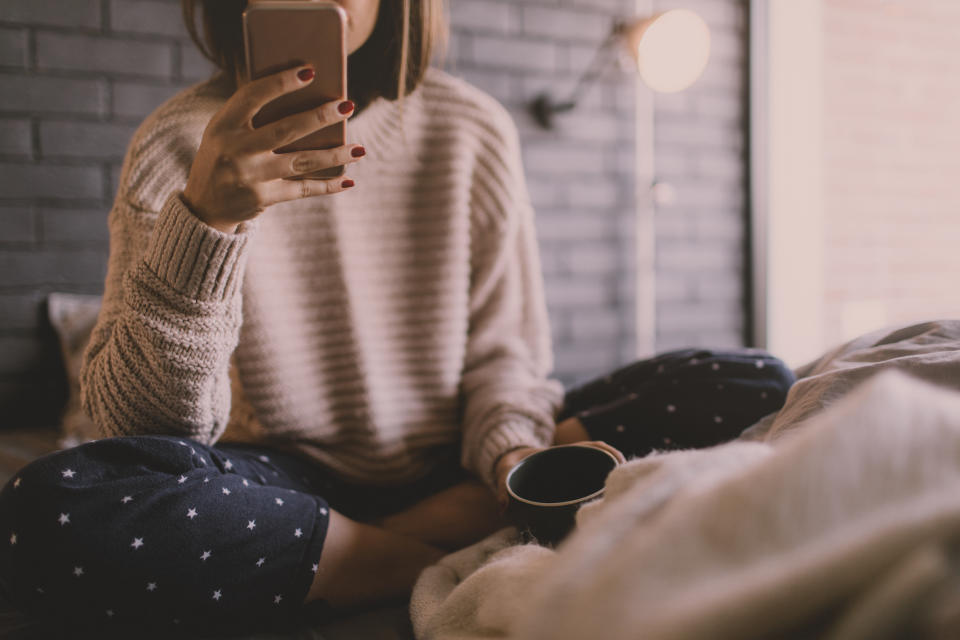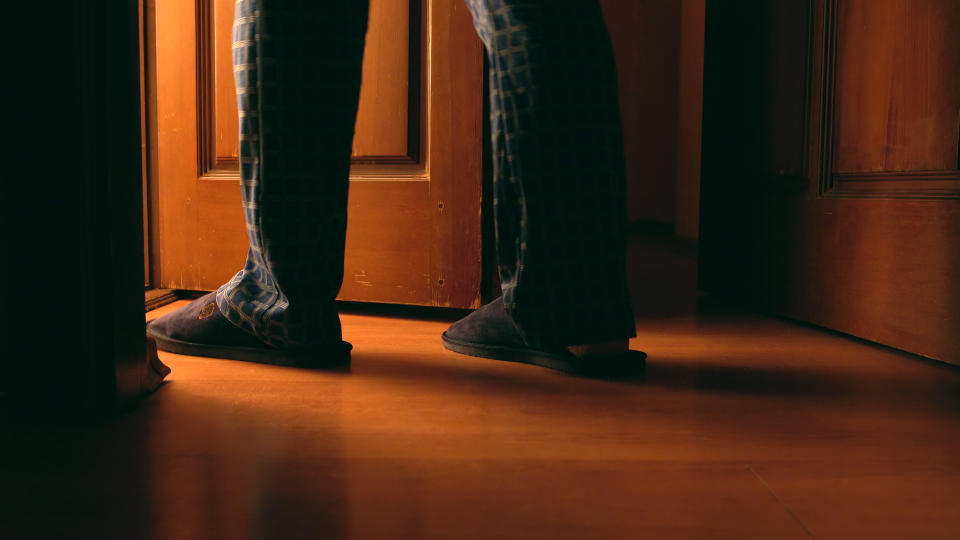What your body is trying to tell you when you wake in the night

One minute you’re deep in the land of nod, snoozing peacefully and dreaming about chocolate cake, the next you’re wide awake in the dead of night and getting back to sleep seems like a distant, well, er, dream.
If this sounds familiar, you’re certainly not alone. A recent study, published in Sleep Medicine estimates that about one-third of adults wake up in the night at least three times a week, and over 40% of those might have trouble falling asleep again.
While you might chalk up a few middle of the night wakes down to a phase, if it is happening regularly it can have some pretty serious consequences on your physical and mental health.
So what’s your body trying to tell you when you wake up in the middle of the night? And how can you stop it happening?
We consulted the sleep experts to find out why you’ve become an inadvertent member of the wide awake club, and the best way to relinquish your membership so you can enjoy a proper night’s sleep.
You’re stressed
Stress and anxiety can absolutely wake you up in the middle of the night.
“Broken sleep or an inability to fall asleep is recognised as a symptom of depression and general anxiety disorder. Therefore, if you are persistently experiencing disturbed sleep, your body may be trying to send you a warning sign that your mental health is suffering,” explains Abie Taylor-Spencer, a Technician for Smart TMS, a mental health clinic specialising in transcranial magnetic stimulation.
So why does stress cause middle of the night wakes?
“When your body experiences anxiety, the stress hormones adrenaline and cortisol are released, which leads to physical symptoms such as tenseness, alertness and an increased heart rate.,” she says.
“This high level of arousal makes it difficult to relax and reduces the ability to fall or stay in a restful sleep.”
If you suspect mental health issues are impacting your sleep Abie suggests visiting your GP who could organise a treatment plan, which may include cognitive behavioural therapy. If sleeping problems persist, they could even refer you to a sleep clinic.
Your room is either too cold, too hot or too bright
You might think you are taking every step to make sure you are getting a good night’s sleep but so many people neglect the most obvious thing, their sleep environment.
“A good environment is an essential part of getting deep, restorative sleep and this means everything from the right light and temperature in your bedroom, to the right comfort of mattress,” explains Dr Nerina Ramlakhan, Silentnight’s sleep expert.
“Turn your bedroom into a calming space that you really want to spend time in, I guarantee you’ll sleep better.”

You’ve drunk too much caffeine
That afternoon espresso may have seemed necessary at the time, but it could lead to night time wakings.
“The half life of caffeine is approximately five hours which means if you have a drink at 5pm you will still have half that amount in your blood supply by 10pm,” explains Dr Ramlakhan. “You probably won’t feel energised by 10pm but the caffeine is still in your system and it’s enough to stop you sleeping well.”
If you are having problems sleeping or are waking up feeling tired no matter how much sleep you get, Dr Ramlakhan suggests minimising your caffeine intake and drinking more water, herbal teas and diluted fruit juices.
You’re worrying about getting enough sleep
“Feeling the urge to constantly check the time is the single biggest disrupter of sleep, yet for so many of us it’s a habit that’s hard to break,” explains Dr Ramlakhan.
“If you wake up in the night and instantly check the time, you’re likely to start calculating how many hours you have left before morning and worrying about how much sleep you’re missing out on.”
This leads to the wake, stress, sleep-less cycle and it is a terrible cycle to get into.
“Obsessively checking the time will only make you more stressed and less able to drift back off,” she explains. “By all means use your phone as an alarm clock, but fight the urge to check it every time you wake up during the night.”
You can’t wait ’til morning to pee
Always wake up in the middle of the night to go to the loo? You might have a condition known as nocturia – described by the the Sleep Health Foundation as the frequent need to get up during the night to urinate. And it is pretty common. A study in the International Neurourology Journal found that out of the 856 people surveyed, around 23% of women and 29 % of men experienced nocturia.
According to the NHS causes of nocturia include drinking too much fluid before bedtime, urinary tract infections, and an overactive bladder. Diabetes could also be a factor, because having too much sugar in your bloodstream forces your body to extract fluid from your tissues, making you thirsty and possibly prompting you to drink and pee more.
If cutting back on your evening fluid intake doesn’t reduce your number of bedtime bathroom visits, it might be worth seeing a doctor for other explanations.

You’re using tech too close to bedtime
That pre-bedtime scroll of Insta could be causing you to wake up during the night. “Our energy tends to run in 60-90 minute cycles and the cycle just before we go to bed is key to getting a good night’s sleep,” explains Dr Ramlakhan.
“When light levels drop in the evening, our circadian timer switches on and stimulates the production of the sleep hormone melatonin. However the use of tech before bed disrupts this natural process.”
Dr Ramlakhan says that screens on phones and tablets emit blue light which suppress the production of melatonin from the brain’s pineal gland and stimulate the production of the chemical dopamine which makes us feel alert and ‘switched on’.
To avoid waking up feeling wired she recommends an electronic sundowner 60-90 minutes before bed.
“This will recalibrate your circadian rhythm and allow your brain to wind down and prepare for sleep,” she says.
You drank alcohol before bed
You might think a few pinots will help you to drift off, but alcohol can play havoc with your sleep cycle. A recent study found that drinking higher doses of alcohol was found to reduce the amount of REM (Rapid Eye Movement) sleep, and resulted in a more shallow sleep during the latter half of the night.
The same study also appeared to adversely affect the part of the brain that usually controls the body during sleep. From this, researchers concluded that the alcohol had disturbed the restorative effects of sleep.
So if you’re looking for quality, sleep-through-the-night rest, it’s worth cutting down your alcohol intake.
You’re sleeping in on the weekend
Sure we all love a weekend sleep in, but it could be impacting your overall sleep pattern and causing those 3am wake ups.
“Although I’m sure we are all guilty of enjoying a lie-in on a Sunday morning, disrupting the schedule you maintain during the week is not conducive to good sleep hygiene,” explains Taylor-Spencer.
She suggests establishing a routine in which you go to sleep and wake up at the same time every day – even on weekends. So long Saturday morning lie-in.
“Ensuring consistency in your sleeping habits will allow your body to set an internal clock and enable you to go to sleep faster and avoid waking up too,” she says.
Got a story tip? Send it to lifestyle.tips@verizonmedia.com
Want more lifestyle and celebrity news? Follow Yahoo Lifestyle on Facebook, Twitter and Instagram.
Or sign up to our daily newsletter here.

 Yahoo Lifestyle
Yahoo Lifestyle 


